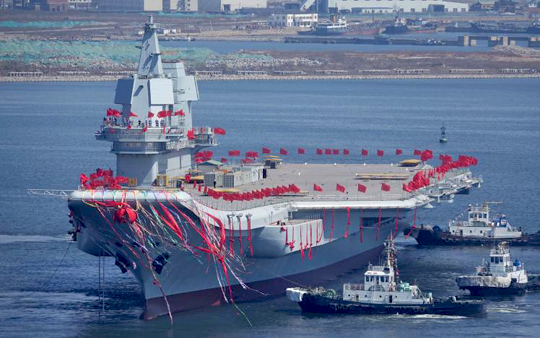Shanghai, Apr 27: China needs to raise its military capabilities to protect its growing overseas interests, its foreign minister said following the launch of China's first domestically built aircraft carrier, but he vowed not to pursue expansionism. China launched the carrier on Wednesday amid rising tension over North Korea and regional worries about Beijing's assertiveness in the South China Sea and its broader military modernisation programme.

Speaking during a visit to Germany, Chinese Foreign Minister Wang Yi said Chinese business and citizens had spread all around the world, with millions of people living overseas and nearly 30,000 Chinese-funded businesses registered in other countries. "Under this new environment, China has ample reason to raise its own national defence capability to effectively protect its fair rights that are increasingly extending overseas," Wang said in response to a question on the new carrier, according to a statement on the ministry's website on Thursday.Wang said China's increased military muscle would help "safeguard international and regional peace".
China would maintain a "defensive" military policy and had "no intention to engage in any kind of expansion", he said.China's navy has been taking an increasingly prominent role in recent months, with a rising star admiral taking command, its first aircraft carrier sailing around self-ruled Taiwan and new warships appearing in far-flung places.
Little has been known, however, about China's domestic aircraft carrier programme, which is a state secret. China also does not give a spending breakdown for its defence budget.But the government has said the new carrier's design draws on experiences from its first carrier, the Liaoning, bought second-hand from Ukraine in 1998 and refitted in China. State media has quoted experts as saying China needs at least six carriers, and a corresponding number of overseas bases to support them.
But experts say China is far from being able to challenge the United States which operates 10 carriers and plans to build two more, and has decades of experience operating them.Unlike the U.S. navy's longer-range nuclear carriers, both of China's feature Soviet-design ski-jump bows, intended to give fighter jets enough lift to take off from shorter decks.But they lack the powerful catapult technology for launching aircraft that US carriers use. The new carrier is not expected to enter full service until 2020.





Comments
Add new comment